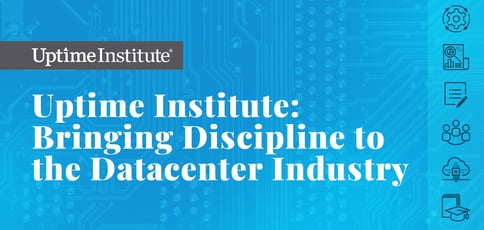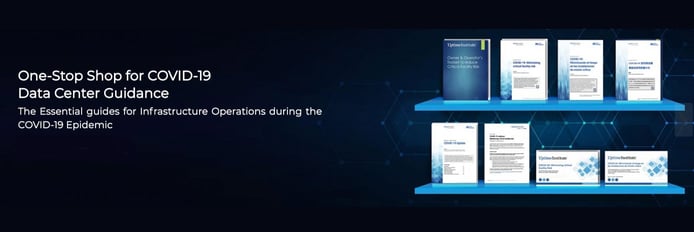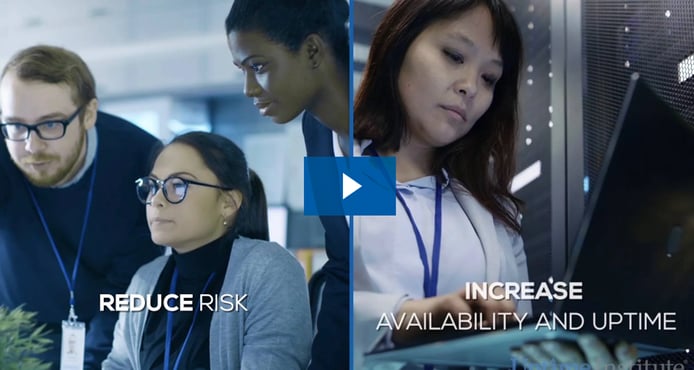
TL; DR: Uptime Institute works in an advisory capacity to improve the reliability, performance, and efficiency of mission-critical server infrastructure. The global organization serves stakeholders in the IT industry via consulting, education, networking, award programs, and highly respected standards. Today, Uptime Institute is also offering helpful guides for navigating server infrastructure during COVID-19 and other uncontrollable events.
If there’s one thing that millions of business professionals could use during these uncertain times, it’s peace of mind: the assurance that they will be able to maintain operations while navigating the current pandemic — and those of the future.
Often, serenity comes with knowing you have the mission-critical server infrastructure necessary to drive revenue online, even when everyone is stuck indoors.
To help infrastructure operators respond to the impact of the COVID-19, Uptime Institute recently released advisory reports packed with best practices for maintaining operations and business continuity.
The reports are just one of the ways Uptime Institute works to improve reliability, performance, and efficiency in the datacenter industry.

Chris Brown, CTO, gave us the scoop on Uptime Institute’s role as the standard-bearer for digital infrastructure.
“One of the things that we’ve always done — and continue to do — is help people manage risk,” said Chris Brown, Chief Technical Officer at Uptime Institute. “We do that through all of our offerings, including our certifications, which are focused on identifying, mitigating, and managing risk.”
Chris told us that it’s especially important to help minimize risks of an outage amid the rising demand for digital infrastructure — whether it’s used to support businesses or keep individuals entertained via streaming video.
“We help people move forward by positioning them with proper and resilient infrastructure and operations, keeping their data safe, and giving them peace of mind through Tier Certification, operational sustainability, and operational offerings,” he said.
In addition to highly-respected industry standards, these offerings include consulting, education, the network, and award programs.
Digital Benchmarks that Help Businesses Overcome Today’s Challenges
Chris, who’s been involved with the datacenter industry for two decades, said he’s seen a dramatic transformation over the years.
“When I first started, the industry was a collection of people with ideas on how to build and operate datacenters, but there wasn’t any real set of standards or benchmarks,” he said. “Uptime Institute has brought discipline to the industry with the benchmarks and principles by which to evaluate, design, and operate datacenters.”
After helping the budding industry grow and mature, Uptime Institute turned its attention to strategies beyond the individual facility.

Uptime Institute now offers comprehensive guides to datacenter maintenance during a pandemic.
“You can build a single datacenter to withstand a whole lot, but over the years, mother nature has shown us that, no matter what we think we can predict, she can do one better,” Chris said.
He cited 2017, when Hurricane Harvey brought hazardous rainfall and flood conditions to Houston datacenters located in a 500-year flood zone — an area designated by FEMA as moderate to low risk.
“No one designs outside of a 500-year floodplain because it’s expensive and dramatically restricts where datacenters can be located — all to prevent something that might happen once in a few lifetimes,” he said. “Events like Hurricane Harvey have driven us to accept that yes, individual facilities have to be strong, but the industry also has to start looking across multiple datacenters in a distributed resiliency approach.”
Chris said many newer companies recognize the need to plan for an anomaly, but Uptime Institute is helping some more established enterprise clients understand the need to distribute business processes across multiple locations and platforms.
Maturing an Essential Industry through Remote Protocols and Consultation
Much like doctors and first responders, datacenter operators are now considered essential workers in that they keep critical infrastructure, including servers, up and running.
“While other businesses have come to a screeching halt, the datacenter industry has not,” Chris said. “We’ve seen companies continue to not only expand their operations and holdings but build facilities and carry on with normal processes.”
To continue supporting this essential industry via consulting, education, the network, and award programs, Uptime Institute has had to pull off a few creative maneuvers. For example, closed borders have made it increasingly difficult for the global authority to provide certifications.
“COVID has presented us with a bit of a challenge because governments have locked down their borders, so there’s very little crossing — even within the U.S.,” Chris said. “In response, we’ve pivoted to a model where all offerings are either remote or have a component of remote delivery. That has allowed us to continue to assess facilities and operations, help people figure out where their risks lie, and help them mitigate those risks — all while continuing to meet their company’s schedules and needs.”
Uptime Institute is also working to connect Network member organizations so that they can learn from the challenges and victories of their peers in this strange new era.
“We want to help them address the individual challenges of a pandemic that no one has really thought about for the past 100 years,” Chris said. “Everything that we do across all of our service offerings is about helping people understand what it is that they need to meet their business needs.”
A Focus on Both Developed and Emerging Markets Worldwide
As an international organization, Uptime Institute works with datacenter facilities in more than 100 countries.
Chris said that one of the things that makes him most proud of his role at Uptime Institute is the fact that the organization strives to improve the datacenter industry in both established and developing markets.
“The datacenter industry looks very different in Europe and North America than it does in Malaysia, where they’re just starting to develop the significant infrastructure that everyone else has taken for granted for a long time, and we tailor our approach accordingly,” he said.
He said he’s also proud of how far datacenters and the internet at large have come in the past few decades: “We’ve essentially gone from a time where regular people relied on the internet for very little to now, where the web operates in such a reliable fashion that people are willing to build entire businesses around it.”
“It’s amazing how much of our lives have been digitized,” he said. “I can remember a time when very little was online. Now we depend on the web for everything from our medical records and finances to our entertainment. It’s all been put on servers in datacenters to help reduce costs, improve capabilities, and serve more people.”
A Long-Term Vision for Operational and Environmental Sustainability
Uptime Institute has long been known for its tier-based system, in which datacenters are classified into four progressive groups based on business function and criteria for maintenance, power, cooling, and fault capabilities.
But Chris said datacenter operators are also concerned about operational sustainability.
“We’re trying to focus on the fact that you can spend hundreds of millions of dollars building a Tier IV datacenter, but if you don’t have the right operations team, it’s not going to pay dividends,” he said. “Then there’s that multisite, multiplatform resiliency we’re continuing to push. You can put a lot of money into trying to make an individual facility bulletproof, but you’re never fully bulletproof unless you spread your eggs across multiple baskets.”
Environmental sustainability is another important area of focus for Uptime Institute. While many facilities pick and choose their level of involvement — concentrating on green power sources or reduced water consumption — Uptime Institute encourages members to view environmental sustainability at the systemic level.
“Several years back, everybody started to focus on using less power to cool our datacenters,” Chris said. “But the areas of the world where evaporative cooling works the best are those where there’s the least amount of drinkable water. The industry as a whole is going to have to it get its head around not one thing or the other — but the full systemic impact.”
If anyone can lead the industry in the right direction on that front, we’d place our bets on Uptime Institute.
HostingAdvice.com is a free online resource that offers valuable content and comparison services to users. To keep this resource 100% free, we receive compensation from many of the offers listed on the site. Along with key review factors, this compensation may impact how and where products appear across the site (including, for example, the order in which they appear). HostingAdvice.com does not include the entire universe of available offers. Editorial opinions expressed on the site are strictly our own and are not provided, endorsed, or approved by advertisers.
Our site is committed to publishing independent, accurate content guided by strict editorial guidelines. Before articles and reviews are published on our site, they undergo a thorough review process performed by a team of independent editors and subject-matter experts to ensure the content’s accuracy, timeliness, and impartiality. Our editorial team is separate and independent of our site’s advertisers, and the opinions they express on our site are their own. To read more about our team members and their editorial backgrounds, please visit our site’s About page.


